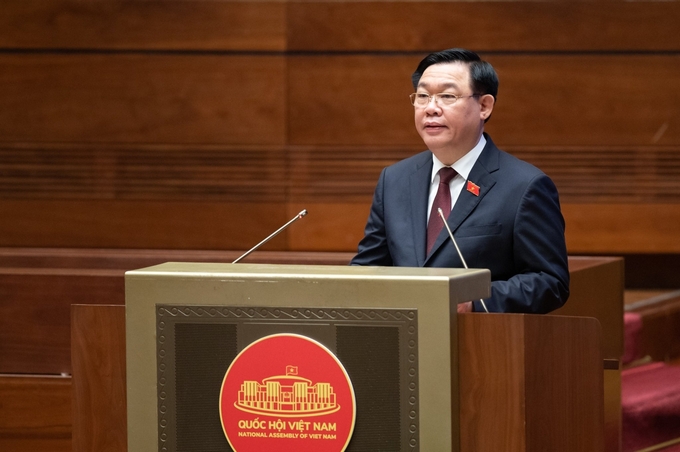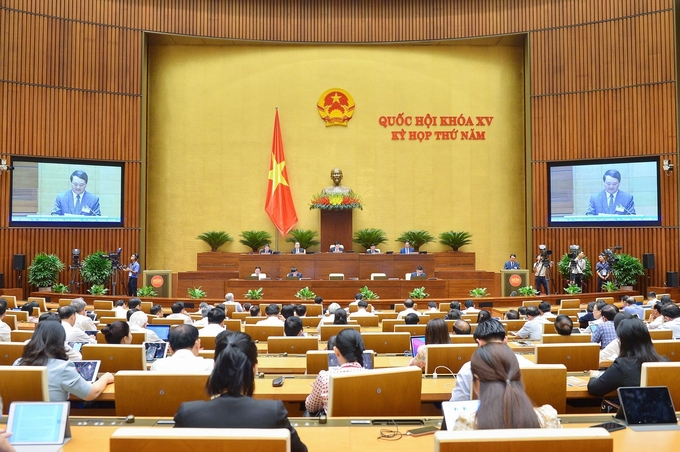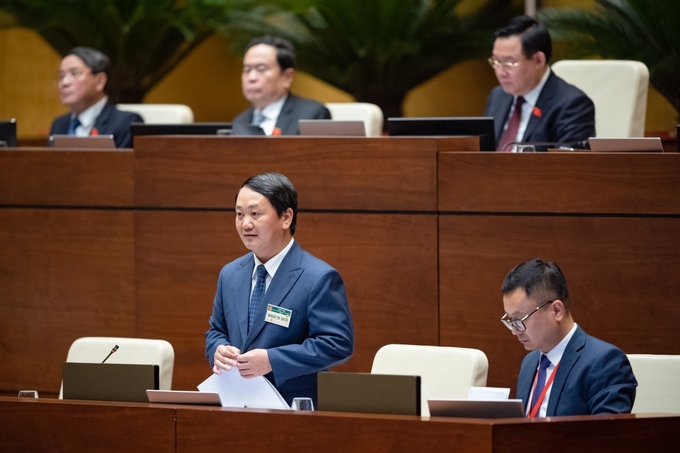June 19, 2025 | 00:26 GMT +7
June 19, 2025 | 00:26 GMT +7
Hotline: 0913.378.918
June 19, 2025 | 00:26 GMT +7
Hotline: 0913.378.918

National Assembly Chairman Vuong Dinh Hue moderated the question-and-answer (Q&A) session on the afternoon of June 6. Photo: National Assembly.
On June 6 afternoon, under the leadership of Politburo member and National Assembly Chairman Vuong Dinh Hue, the 15th National Assembly held a plenary session in the conference hall. In this meeting, the National Assembly inquired about the second topic of ethnicity.
The National Assembly Chairman announced the question-and-answer (Q&A) session would focus on critical issues, including CEMA’s responsibility and coordination with ministries and departments to implement national target programs (building new rural areas for 2021–2025; sustainable poverty reduction for 2021–2025; socio-economic development in ethnic people’s inhabited areas for 2021–2030).
In addition, a policy aimed to attract resources and investment, supporting the development of mountainous areas with difficult and extremely difficult socio-economic conditions. Solutions to overcome difficulties and obstacles in ethnic policy were connected to the allocation of communes and villages in ethnic people’s areas. The problems were complicated by settlement land, productive land for ethnic minorities, spontaneous shifting cultivation, and deforestation.
At the Q&A session, delegate Pham Van Hoa (Dong Thap) said that the poverty exit rate was not as expected since many households wanted to avoid escaping poverty. The delegate stated the mentality of refusing to exit poverty was quite common across the country. If no measures were soon implemented, the State’s poverty eradication program would not be effective.
The delegate requested the Minister to inform him about the cause and solution so that people could be aware of transitioning out of poverty collectively.
Answering the problem that many households in poor areas do not want to exit poverty, Minister Hau A Lenh said that, through researching documents of relevant ministries, regions, and surveys, this phenomenon was true, having its roots in many factors.
Although people exited poverty, in actuality, their lives were still in discomfort. People transitioning out of poverty could hardly improve their income while not receiving support from the government.
According to the Minister, to solve this problem, it is necessary to implement synchronous and unified solutions. Principles and criteria for poverty reduction have been promulgated. Local administration needs to work objectively and responsibly to acquire data, summarize and review poor households nationwide. This will ensure people exit poverty sustainably, and guarantee minimum conditions for people to live with peace of mind.
“Besides, it is crucial to take measures to propagate and persuade people to understand the policies implemented by the Party and State so that people voluntarily rise,” said Mr. Hau A Lenh.

Issues related to ethnic minorities and mountainous areas were answered by CEMA Minister and Chairman Hau A Lenh in front of the National Assembly. Photo: National Assembly.
Accordingly, the systematic criteria for poverty reduction also depend on the country’s conditions and circumstances on the development of each stage. It is necessary to develop a system of appropriate and comprehensive criteria. The goal is a suitable criteria system so that people out of poverty can live well without falling back into poverty.
Delegates also mentioned recurring nomadism among some ethnic minorities, despite local authorities creating favorable conditions for productive land, housing, and life support. These policies support disadvantaged people to live in stability and keep a house. However, it still needs to be more effective for some input sectors at the moment.
Regarding this issue, the Minister said that CEMA is facing problems because there needed to be regulations about divisions of support for housing, residential land, and domestic water use.
Recently, CEMA submitted to the Government Decision 4 to regulate divisions of houses and residential land. Thus, there are primary divisions for local authorities to implement.
However, problems persist since the source of support for this project is public investment, which according to the Law on Public Investment, each project follows a very complicated basic planning process.
Through research and review, Decree 27 has been revised, allowing the structure to be applied to the people. It is impossible to set up a joint project because these projects are direct investments in individual households instead of communities and villages. Thus, two issues in this project have been solved.
Regarding capital allocation for the National target program on socio-economic development in ethnic minorities and mountainous areas, the Chairman said that CEMA had advised the Government to submit sufficient capital allocation to the National Assembly Standing Committee in accordance with the Resolution from now to 2025.
In addition, there are other capital sources in the program’s capital structure, including credit and local counterpart funds. Regarding fundraising outside the state budget, we have mobilized ODA and other social capital sources.
CEMA Chairman affirmed that until now, the Government has submitted to the National Assembly to allocate sufficient resources according to the annual plan to distribute the capital as approved by the National Assembly.
Regarding solutions to mobilize other capital sources, CEMA Chairman said that immediately after submitting the investment policy to the Prime Minister for approval, CEMA coordinated with the Ministry of Planning and Investment, among other ministries and departments, to advise the National target program steering committee to develop a plan to mobilize capital sources other than the state budget, including capital from ODA, enterprises, and corporations. However, between 2021 and 2022, the country faced many difficulties because of the pandemic; businesses also faced many challenges. Therefore, during that period, there needed to be an inquiry of mobilizing resources.

Minister Hau A Lenh during the Q&A session on June 6 afternoon. Photo: National Assembly.
Regarding ODA, CEMA has a project in coordination with the Ministry of Education and Training, among other ministries and departments, to work with the World Bank, mobilizing a budget of nearly 9,000 billion. Currently, the policy framework has been completed, and local administrations have been surveyed to invest in 75 roads in extremely difficult communes.
The policy framework was approved by the World Bank. However, during the 2022 negotiation process, some problems persisted when the National target program was not implemented and the state capital was not disbursed, pressuring public debt. Some ministries and departments considered pausing this process and waiting for the right time.
The World Bank agreed to pause until the end of fiscal year 2022, so this project is currently on hold. CEMA will coordinate with ministries and departments to report to the Government about further study and renegotiation of this project.
CEMA Chairman stated that, regarding the possibility of mobilizing capital outside the budget for the implementation of the Program per the National Assembly’s Resolution, CEMA would commit from now to 2025.
Regarding the sources mobilized from local organizations currently under pressure, CEMA shall report to the Government at an appropriate time, depending on the situation.
Developing supportive policies with centralized and concentrated implementation
Also during the Q&A session, CEMA Minister and Chairman Hau A Lenh affirmed that there were many ethnic groups living outside the project area and could not benefit from national target programs.
Therefore, implementing Resolution 120/2020/QH14 of the National Assembly on approving investment policies within the National target program for socio-economic development in ethnic minority areas, CEMA will focus on investing resources in the most burdensome areas.
In the later stage of the National target program for socio-economic development in ethnic minority areas, 12 policies will focus on solving problems in Decision 861. Next, ethnic minorities and ethnic minority areas will benefit from policies to develop appropriate protocols in the following period.
Thus, these solutions are comprehensive, centralized, concentrated, and diverging in each period to invest and support people. Regarding CEMA’s responsibilities, it will coordinate with ministries and departments to evaluate, review, and propose to competent authorities in order to adjust, amend and supplement inadequate policies while regulating new policies for later phases.
Translated by: Quynh Chi

(VAN) According to the Binh Thuan Department of Industry and Trade, in the first five months of 2025, Binh Thuan's dragon fruit export turnover increased by 20.65% compared to the same period last year.

(VAN) EU countries on Thursday gave final approval to new tariffs on fertilizer imports from Russia, a move aimed at cutting off revenue that could support Moscow’s war in Ukraine, despite concerns from European farmers.

(VAN) The working delegation from the Ministry of Agriculture and Environment conducted an important trip to the Netherlands to strengthen strategic partnerships and sustainable development in the agricultural sector.

(VAN) The letter ‘A Plea from the Ocean’ not only evokes emotion but also awakens the human conscience to the responsibility of protecting life on Earth.

(VAN) The Department of Agriculture in South Africa has announced the country’s first mass vaccination of poultry to prevent local birds from contracting avian influenza.

(VAN) Establishment of the Mekong Delta Regional Agricultural Linkage Center, aiming for a closed value chain, deep processing, trading platforms, and international market connectivity.

(VAN) Gia Lai province has recently recorded 460 rare species of animals and plants, contributing to forest conservation and biodiversity planning in the region.